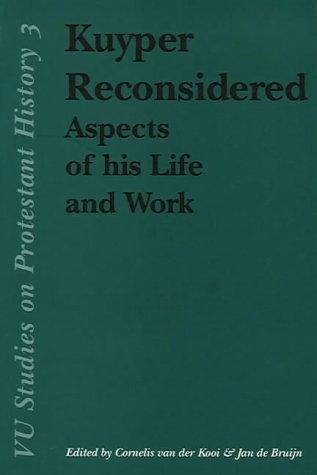J. de Bruijn (1999), 'Abraham Kuyper as a romantic', in C. van der Kooi and J. de Bruijn (eds) Kuyper Reconsidered:Aspects of his Life and Work, VU Studies on Protestant History Amsterdam VU Press, ch.3.
This paper looks at two other Dutch men, Multatuli and Van Eeden, and compares Kuyper to them. He maintains that Kuyper was a romantic. However, he doesn't fully define what he means by Kuyper as a romantic. For de Bruijn being a romantic seems to imply an inner conflict, a melancholia and hypocondia as well as a poetic streak.
Sewell, Keith (2003), 'Calvin and the stars, Kuyper and the fossils: some reflections of historiographical reflections', Pro Rege, 10-22.
Also in J Kok (ed) Celebrating the Vision: the Reformed perspective of Dordt College (Sioux Center, IA: Dordt College Press, 2004).
Sewell examines how Calvin's and Kuyper's view of astronomy and evolution has been misconstrued. He uses these incidents to show how historiography can be used to prevent this misreading. He shows that there is a tendency for Kuyper to become 'evangelicalised'. He takes to task McGoldrick's biography for being susceptible to this. Kuyper was certainly against evolutionism but not necessarily against the scientific theory. Kuyper is closer to Calvin than to fundamentalism.
Engelsma, David J. (editor) (1998), Standard Bearer 75(2)
This issue of the Standard Bearer is devoted to Kuyper. It would seem an unusual choice as it was a reaction against Kuyper's views on common grace that promted the PRC-CRC split in 1924. The PRC rejected common grace and as such rejected Kuyper as 'the theologian of common grace'.
These series of articles focus on different aspects of Kuyper. But the continula cry is that Kuyper was best seen as a theologian and not as a cultural activist. There is a stress on Kuyper as a good reformed theologian; for example 'His theology although imperfect, was solid, sound, biblical and creedal Reformed doctrine'. The continuity between Hoeksema, one of the original dissenter's to common grace is also highlighted: 'the theology of Hoeksema is essentially that of Kuyper' and 'Hoeksema spoke highly of Kuyper and his theology'. Here then is a reappropriation of Kuyper minus his theology of common grace. As Terpstra puts it:
Contents
Meditation - Abraham Kuyper
This paper looks at two other Dutch men, Multatuli and Van Eeden, and compares Kuyper to them. He maintains that Kuyper was a romantic. However, he doesn't fully define what he means by Kuyper as a romantic. For de Bruijn being a romantic seems to imply an inner conflict, a melancholia and hypocondia as well as a poetic streak.
Sewell, Keith (2003), 'Calvin and the stars, Kuyper and the fossils: some reflections of historiographical reflections', Pro Rege, 10-22.
Also in J Kok (ed) Celebrating the Vision: the Reformed perspective of Dordt College (Sioux Center, IA: Dordt College Press, 2004).
Sewell examines how Calvin's and Kuyper's view of astronomy and evolution has been misconstrued. He uses these incidents to show how historiography can be used to prevent this misreading. He shows that there is a tendency for Kuyper to become 'evangelicalised'. He takes to task McGoldrick's biography for being susceptible to this. Kuyper was certainly against evolutionism but not necessarily against the scientific theory. Kuyper is closer to Calvin than to fundamentalism.
Engelsma, David J. (editor) (1998), Standard Bearer 75(2)
This issue of the Standard Bearer is devoted to Kuyper. It would seem an unusual choice as it was a reaction against Kuyper's views on common grace that promted the PRC-CRC split in 1924. The PRC rejected common grace and as such rejected Kuyper as 'the theologian of common grace'.
These series of articles focus on different aspects of Kuyper. But the continula cry is that Kuyper was best seen as a theologian and not as a cultural activist. There is a stress on Kuyper as a good reformed theologian; for example 'His theology although imperfect, was solid, sound, biblical and creedal Reformed doctrine'. The continuity between Hoeksema, one of the original dissenter's to common grace is also highlighted: 'the theology of Hoeksema is essentially that of Kuyper' and 'Hoeksema spoke highly of Kuyper and his theology'. Here then is a reappropriation of Kuyper minus his theology of common grace. As Terpstra puts it:
The legacy left by Dr. Abraham Kuyper to the Reformed faith and churches is for the most part a great and beneficial one. A significant exception to this is Kuyper's development and promotion of the doctrine of common grace. As much as we appreciate what Kuyper gave to the Reformed churches, including our own, in many areas, we must criticize, condemn, and cast away his teaching on common grace.There is an emphasis on Kuyper as church reformer and his role in the Doleantie and the subsequent reunion with the 1834 Afscheiding succession and on his views of particular grace.
Contents
Meditation - Abraham Kuyper
- When What Is Mortal Is Swallowed Up by Life
- Introduction
- "Father" Abraham or The Indebtedness of the PRC to Abraham Kuyper
- A Short Biography
- The Doleantie
- --and the Union of 1892
- The Son of God Eternally our Mediator
- Developer and Promoter of Common Grace
- Do We Hold to Kuyper's View of Presupposed Regeneration?
- Politician-a Critique
- "Creating a Christian Worldview: Abraham Kuiper's Lectures on Calvinism" Peter
S. Heslam (Reviewed by Prof. D. Engelsma)



No comments:
Post a Comment